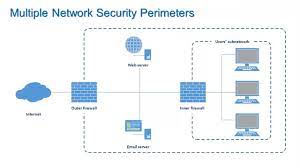The Importance of Firewall Security in Safeguarding Your Network
Firewalls play a crucial role in protecting your network from cyber threats and unauthorised access. Acting as a barrier between your internal network and external sources, firewalls monitor and control incoming and outgoing network traffic based on predetermined security rules.
One of the key benefits of firewall security is its ability to prevent malicious entities from infiltrating your network. By analysing data packets and determining whether they meet established security criteria, firewalls act as gatekeepers that filter out potentially harmful traffic.
Additionally, firewalls help enforce network security policies by blocking access to certain websites or applications that may pose risks to your organisation. This proactive approach to filtering internet traffic helps mitigate the chances of employees inadvertently accessing malicious sites or downloading harmful files.
Firewall security also plays a vital role in safeguarding sensitive data within your network. By monitoring and controlling data transmissions, firewalls prevent unauthorised users from accessing confidential information stored on servers or workstations.
Furthermore, firewalls can be customised to meet the specific needs of your organisation. Whether you require a traditional hardware firewall for robust protection at the network perimeter or a software-based firewall for individual devices, there are various options available to suit your requirements.
In conclusion, firewall security is an essential component of any comprehensive cybersecurity strategy. By implementing robust firewall solutions, you can fortify your network defences, reduce the risk of cyber attacks, and safeguard your valuable data from potential threats.
Six Essential Tips for Enhancing Your Firewall Security Measures
- Ensure your firewall is always enabled and properly configured.
- Regularly update your firewall software to protect against the latest threats.
- Create specific rules for inbound and outbound traffic to control what data can enter or leave your network.
- Consider using an Intrusion Detection System (IDS) in conjunction with your firewall for added security.
- Monitor firewall logs regularly to detect any suspicious activity or potential security breaches.
- Educate employees about the importance of firewall security and best practices for safe internet usage.
Ensure your firewall is always enabled and properly configured.
To enhance your network security, it is crucial to ensure that your firewall is consistently enabled and correctly configured. By keeping your firewall active, you create a strong barrier against malicious threats attempting to breach your network. Proper configuration ensures that the firewall’s rules and settings align with your security requirements, allowing it to effectively filter incoming and outgoing traffic based on predefined criteria. Maintaining a vigilant approach to firewall management is essential in safeguarding your network from potential cyber threats and maintaining a secure digital environment.
Regularly update your firewall software to protect against the latest threats.
Regularly updating your firewall software is a critical step in enhancing your network security posture. By staying current with the latest software updates and patches, you ensure that your firewall is equipped to defend against emerging cyber threats and vulnerabilities. These updates often include essential security enhancements and bug fixes that help strengthen the effectiveness of your firewall in detecting and blocking malicious activities. By prioritising regular updates, you can proactively safeguard your network infrastructure and minimise the risk of potential security breaches.
Create specific rules for inbound and outbound traffic to control what data can enter or leave your network.
Creating specific rules for inbound and outbound traffic is a fundamental tip in firewall security that allows you to exert precise control over the flow of data entering and exiting your network. By defining these rules, you can dictate which types of traffic are permitted or blocked, thereby enhancing your network’s security posture. This proactive approach not only helps in preventing unauthorised access from external sources but also ensures that sensitive data remains protected as it traverses through your network. Customising firewall rules for inbound and outbound traffic empowers you to enforce strict security policies tailored to your organisation’s unique requirements, ultimately bolstering your overall cybersecurity defences.
Consider using an Intrusion Detection System (IDS) in conjunction with your firewall for added security.
When enhancing your network security, it is advisable to consider incorporating an Intrusion Detection System (IDS) alongside your firewall for an extra layer of protection. While firewalls act as a barrier against unauthorised access, an IDS monitors network traffic for suspicious activities or potential security breaches. By combining the capabilities of a firewall with the intrusion detection capabilities of an IDS, you can strengthen your defences and swiftly identify and respond to any threats that may bypass the initial firewall protection. This proactive approach can significantly enhance your overall security posture and help safeguard your network from advanced cyber threats.
Monitor firewall logs regularly to detect any suspicious activity or potential security breaches.
Regularly monitoring firewall logs is a crucial tip in maintaining robust firewall security. By reviewing these logs on a consistent basis, organisations can proactively detect any signs of suspicious activity or potential security breaches within their network. Monitoring firewall logs allows IT teams to identify unusual patterns, unauthorised access attempts, or other anomalies that may indicate a security threat. This proactive approach enables prompt investigation and response to mitigate risks and protect the integrity of the network infrastructure.
Educate employees about the importance of firewall security and best practices for safe internet usage.
It is crucial to educate employees about the significance of firewall security and promote best practices for safe internet usage within the workplace. By raising awareness about the role of firewalls in protecting sensitive data and preventing cyber threats, employees can better understand their responsibility in maintaining a secure network environment. Encouraging safe internet practices, such as avoiding suspicious links and downloads, can help mitigate risks and enhance overall cybersecurity resilience. Empowering staff with knowledge about firewall security not only strengthens the organisation’s defences but also fosters a culture of vigilance and proactive risk management.

